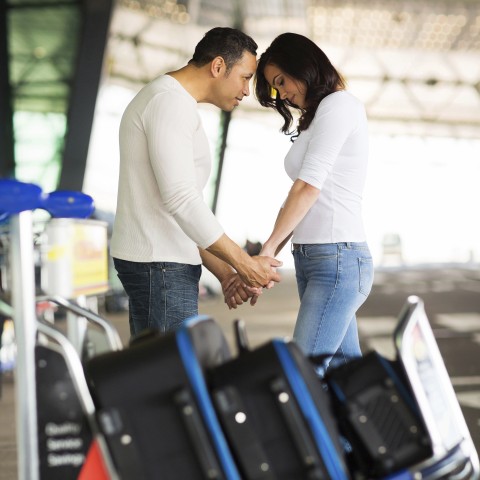
Time to say goodbye? In Afrikaans, this can be just as difficult to do as in any other language. Because hey, who likes goodbyes?! Wishing friends and loved ones farewell is never pleasant nor easy, especially if the parting is permanent or long-term.
But even this depends on how you look at it. As Winnie the Pooh wisely says:
“How lucky I am to have something that makes saying goodbye so hard.”
Not all goodbyes are terribly hard or sad, though. In this article, AfrikaansPod101 will show you several ways to say goodbye in Afrikaans and how to use the right one for every occasion.
As a complement, you can also learn How to Say Hello in Afrikaans in our dedicated blog post before continuing with this one. It’s super-easy!
Like saying hello, saying goodbye in Afrikaans isn’t really that difficult to master. Most Afrikaans goodbyes are Anglicized, meaning they’re taken from the English language. Let’s dig in! Start with a bonus, and download the Must-Know Beginner Vocabulary PDF for FREE!(Logged-In Member Only)
 Table of Contents
Table of Contents
- How to Say Goodbye in Afrikaans
- Body Language and Gestures When You Say Goodbye in Afrikaans
- How AfrikaansPod101 Can Help You Master Saying Goodbye in Afrikaans!
1. How to Say Goodbye in Afrikaans

1. Totsiens / “Goodbye”
Totsiens is a contraction of Tot weersiens, which literally means “Till I see you again.” Of course, the implication is that you wish the person well until you see each other again.
Like its English equivalent, Totsiens is used on its own, and is a common way of indicating that you’re taking leave of someone’s presence. You can use it in both formal and informal situations, and it’s often used when you won’t be seeing that person for a long time.
When addressing a boss or someone important, some Afrikaners like to add the person’s name, like this:
- Totsiens, Meneer De Beer. (“Goodbye, Mister De Beer.”)
This form of address is slightly more respectful than only using Totsiens, but it’s not by any means required for proper social etiquette. You won’t have committed an unforgivable social gaffe by omitting the person’s name.

2. Baai! / “Cheers!”
Baai is used among people who know each other well—like family, friends, and close colleagues—because it’s super-informal and should be used mostly in casual situations. The word is a rather cheerful way of saying goodbye in Afrikaans, so it’s best not to use it for solemn or sad partings.
It’s common to say Baai! when you’re going to see or have contact with that person again soon, though you can also use it in other situations. For instance, you could say this when parting with a friendly shop assistant whom you just had a casual, friendly chat with.
Afrikaners like chatting with everyone, especially in the rural areas of the country! We tend to be a bit more reticent and private in cities like Johannesburg and Pretoria, but even in those places, foreigners making friendly small talk with Afrikaners won’t be rebuffed. Cape Town, in particular, is known to be a very friendly city, so chat away when you visit there! Sincerity and politeness in your dealings with people are key, though.
Baai is a contraction of Koebaai, which is Afrikaans slang for “Goodbye.” (Check out some of the other cool Afrikaans slang words we use in South Africa!)
A fairly common, yet new, convention is to say Baai-baai-baai in a hasty, almost absent-minded manner. Heaven knows where this originated from. Alternatively, you could say Baai-baai! or Ba-baai, which are both translations of the English “Bye-bye!” Children often greet this way.

A variation of this goodbye is the English Ta-Ta! It could be derived from the English slang for “thanks,“ which is “Ta!” So, then it would be like saying “Thanks-thanks!” Anyway, this is a very casual, informal way to say goodbye in Afrikaans, most often used with babies and children. Smile widely and wave enthusiastically while saying this!
3. Sien jou later! / “See you later!”
Like its English equivalent, this Afrikaans goodbye phrase is fairly casual and normally used when the parting is temporary. You could use this when you’ve made a fixed appointment or have a date with someone, or when you know you’re going to see them later in class or at work, for instance.
This phrase is considered an Anglicism, and is almost always used among people who are of equal status. However, it wouldn’t be considered rude to say this to your supervisor or boss.
The nuance is very subtle, but young people—or other Afrikaners who know each other extremely well—won’t, as a rule, say goodbye in Afrikaans this way. It’s just a smidgen more formal and polite than other phrases, and more common among older folks living in rural areas. That said, there’s nothing wrong with saying bye in Afrikaans this way if you opt to do so!

4. Sien jou weer. / “See you again.”
This one’s a variation of the previous greeting. It’s typically not used literally, though, meaning you don’t need to have a fixed date or appointment with someone to use this phrase. It’s more of a polite and friendly way for equals to part ways when they don’t know each other very well.
For instance, you could confidently use this goodbye phrase with acquaintances in the workplace or when parting ways with someone you met at a party. It’s more of a polite conversation filler than a sincere wish.

The phrase is often used with the adverbial graag, like this: Sien jou graag weer. There’s no literal translation for graag in English. It adds a sense of willingness and eagerness to the phrase (such as “really” does, in English), and it could indicate that you mean what you say. Use this one with some care, though, as you don’t want to appear overly eager or needy.
5. Geniet die dag. / “Have a good day.”
This is another popular Anglicism, and it’s slightly more formal than the previous one. Often, the local dominee (“pastor”), apteker (“pharmacist”), or skoolhoof (“school headmaster”) will use it as a friendly, benevolent phrase to see people off with.

While a wave and a smile will do, this one can be accompanied by a handshake. It’s also common to combine it with Totsiens, as in: Totsiens, Magda. Geniet die dag! (“Goodbye, Magda. Enjoy your day!”)
A common variation is: Geniet jou dag. (Literally: “Enjoy your day.”)
6. Kyk mooi na jouself. / “Take care.”
Kyk mooi na jouself is used a little differently from the English “Take care,” even though it means the same thing. It’s seldom used as a stand-alone goodbye in Afrikaans, but rather gets used like this: Totsiens en kyk mooi na jouself, Magda. (“Goodbye and take care, Magda.”)
Changing the word order is also acceptable, like this: Kyk mooi na jouself, Magda. Totsiens. (“Take care. Goodbye, Magda.”)
This is often used by someone who wants to express concern for the other person. A parent would say goodbye like this to their child who’s leaving for college in another city, for example. Or a caring colleague would say this to someone on sick leave. You could also round off a conversation with this phrase when visiting a friend, colleague, or loved one in the hospital.

7. Mooi loop! / Literally: “Walk well!”
This phrase is a more casual variation of the former Kyk mooi na jouself (“Take care”), and it’s a very typical Afrikaans saying. These days, it’s mostly used by older Afrikaners.
It can be used in any situation, and implies that you wish a pleasant journey for the other person. However, it’s not reserved only for people who are actually going on a journey!
Mooi loop! can be used as a stand-alone goodbye. However, it’s not really appropriate if the person you’re greeting is of much higher rank than you, or if your relationship with them is formal.

8. Goed gewees om jou te sien. / “Good seeing you.”
This colloquial goodbye phrase is pretty self-explanatory—use it when you want to indicate that an encounter with someone has been a pleasant experience. It can be used when meeting up with, or bumping into, an acquaintance or friend you haven’t seen for a long while. In such a case, you would probably add the adverb: weer (“again”), as in: Goed gewees om jou weer te sien. (“Good seeing you again.”) However, the additional adverb is completely optional.

This phrase can also be written in a thank-you note to the hosts after an event such as a wedding or school reunion. It can denote slight formality, but older, very polite or official Afrikaners often use it as a standard parting phrase.
9. Ek gaan nou loop. OR Ek loop nou. / “I’m leaving now.” OR “I’m out.”
There are two distinct ways of using this goodbye in Afrikaans.
First, the positive scenario:
Picture yourself at work after a long Friday at the office, or after an exhausting shift at the hospital. You’ve just gotten done with work and are free to go. That’s it! You grab your stuff and cheerfully announce your departure (to nobody in particular) with this phrase. Whoever hears it will perfectly get your mood and intention, and may even follow suit. This is a very casual phrase and most often followed by a friendly, if not absent-minded, Baai! or Totsiens!

Then there’s the less positive scenario:
You’re engaged in an argument with a friend or Special Person (SP), but it’s clear that the conversation is going nowhere. Perhaps one of you gives up and leaves with a curt, unfriendly: Ek loop nou. (“I’m out.”) Just like the English expression, the way you say it makes all the difference. We recommend that you don’t use this too often, though, as it can be somewhat passive-aggressive if you’re the stubborn, unrelenting one!
10. Ek moet hardloop. / “I gotta run.”
Like its English counterpart, this phrase denotes a sense of urgency, and it could imply that you’re late for another appointment.
It’s actually more of a statement than a real goodbye in Afrikaans! Therefore, it’s most often used with the prefix Dis laat (“It’s late”), as in: Dis laat, ek moet hardloop. (“It’s late, I must run.”)
However, Afrikaners sometimes use it as an out when we feel a bit stuck in a conversation or situation! You know, to escape from that person who seems unable to read your body language. Or from your slightly inebriated colleagues who don’t want to let you leave after a work party.
In these cases, a more serious phrase would be appropriate, such as: Ek moet gaan. (“I must go.”) If said with a tone of urgency and a glance at your phone or watch, it could be all you need to get away! Legitimate and useful, but don’t use it too often with people you care about. They might feel that you don’t have time for them.
This phrase is always used with Baai! or the slightly more formal Totsiens.

11. Vaarwel. / “Farewell.”
Vaarwel is no longer used in spoken Afrikaans, unless you’re on stage and wishing your beloved from another era a melodramatic goodbye. It means you’re never going to see that person again, but these days (fortunately), its use is pretty outdated.
The word originates from a time when it was more common to say goodbye to people forever. Imagine a girl from the 1600s sobbing inconsolably on a harbor, while waving to her sailor lover on a ship that’s heading out toward new, uncharted worlds. It literally means the same as the English version: “Sail well.” The chances of their reunification were very slim, though, so saying Vaarwel usually meant goodbye forever.

2. Body Language and Gestures When You Say Goodbye in Afrikaans
When you say goodbye, body language is just as important as the words you use.
A) Eye Contact, Smiling, and Keeping a Distance
Afrikaners like friendly people! But more than that, it’s important to remember that natural, spontaneous eye contact, in particular, is big among Afrikaners. It shows that you’ve got nothing to hide and are willing to allow other people to “read” you.
Ferociously staring in a deadly eyelock is unnecessary, though. No need to impersonate Ghengis Khan or Derren Brown to show your sincerity! Afrikaners would find this inappropriate and scary.
In the same vein, saying goodbye with eye contact that says “Helloooo Baby…” is not appropriate either. Maintaining eye contact for too long, or doing so in an intimate manner, will make Afrikaners feel uncomfortable. Unless you intend to seduce, of course! In this case, different etiquette will apply—seduction is an art best approached with circumspection.
Afrikaners are a warm and friendly people, but we don’t like over-explicit sensual gestures in public, especially in more conservative communities and rural areas. We make reasonable allowance for couples in love, of course, but our manners in this regard are still rather British.

Afrikaners tend to be private people, even when you know them well. So keeping at least a meter (or three feet)’s distance when saying goodbye is a safe move. If they indicate that they want you closer for a bear hug or an air kiss, then fine, but it’s better for you not to initiate this yourself.
How you say goodbye in Afrikaans, concerning your gestures and actions, will definitely depend on how well you know the people.
B) Close Friends and Family
If you know the person very well, hugs are not only permitted when you say goodbye—they’re often required! This is especially true if the parting is going to be a long, sad one. Unless they’re family or your SP, don’t hug too tightly though.
Kissing is also allowed, even on the lips, if you’re close. But then, only a peck. A kiss on the cheek is also appropriate for friends.
As a rule, Afrikaner men avoid public displays of affection, especially with other men. Most often, they will shake hands, just like they do when they first greet. That said, even men are known to briefly hug a close friend with a casual arm slung over the shoulders. Cameradie is important, especially if the goodbye is difficult.

Fist-bump goodbyes are increasingly popular among young people and school kids, as is throwing the V-sign (or victory sign), with the fore and middle fingers raised in a fist. It’s also called the Peace Sign. However, this gesture is particular to a specific demographic. So, don’t use it with the bank manager, a police officer, or your boss, for instance. Unless they’re also a rapper, of course.

While we don’t like melodrama, we’ll understand if you’re too sad for a smile. A few tears are acceptable, even welcomed, but save the total breakdown for when you’re alone in private. Your Afrikaner friends will understand if you cry, and will try to console you—but they might feel a bit embarrassed, too. As mentioned, we don’t love public displays of strong emotion, as it makes us feel vulnerable.
Unless you’re very close! Then go ahead; a good bawling session will likely be infectious and solidify your bond even more. Make sure to keep the tissues close for everyone, though; your efficiency will be appreciated.

C) Informal and Formal Situations: Etiquette When Saying Goodbye to Women
Men, be respectful when you hug an Afrikaner woman who’s not your significant other. Be sensitive to the signals she sends you, and if she doesn’t indicate that it’s okay, or if you’re not sure, don’t reach for a hug at all!
An air kiss by the ear or cheek while lightly touching her shoulder would probably be the safest option (if she’s a relatively close friend). You don’t want to look for trouble with her Afrikaner husband; they’re notoriously protective of their women! The best thing may be to just offer your hand for a handshake, regardless of the situation. Allow her to take the lead.
D) Informal and Formal Situations: Etiquette for Colleagues and Strangers
In most cases, a smile, eye contact, and a handshake would be appropriate and acceptable among Afrikaner men and women. Offer your right hand and keep a respectful distance.
If the person is senior to you, wait for them to offer their hand first, though. This is a sign of respect. Jutting your hand out first toward the CEO of your company or a dignitary, such as a cabinet minister, would be considered a bit too forward.
3. How AfrikaansPod101 Can Help You Master Saying Goodbye in Afrikaans!
We hope you enjoyed learning about how to say goodbye in Afrikaans with us. Are you ready to start practicing the vocabulary, or do you still have questions? Let us know in the comments!
AfrikaansPod101 takes the lead with many excellent Afrikaans learning tools to help you master the language easily and almost effortlessly. We have so many learning options for you!
Our well-researched tools include:
1. An extensive series of vocabulary lists, updated regularly.
2. A new Afrikaans word to learn every day. Master these words easily with our recordings and flashcards!
3. Access to numerous recordings, such as this Afrikaans Vocab Builder.
4. A free Afrikaans online dictionary.
5. An excellent 100 Core Afrikaans Words list!
Learn much faster with the help of a personal tutor, who will first let you take an assessment to personalize your training.
These teachers are very helpful when you bump into challenges during your studies. Your very own friendly, Afrikaans-speaking teacher will be only a text away on a special app, anywhere, anytime. Using a guided learning system, which was developed by experts in language and online education, they’ll be giving you personal feedback and constant support so you can learn and improve quickly. You’ll also be tasked with weekly assignments in reading, writing, and speaking, to really hone your Afrikaans language skills.
Don’t hesitate—enroll with AfrikaansPod101 now!










